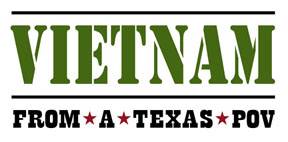


SEPTEMBER 1—JANUARY 31, 2005
VIETNAM FROM A TEXAS POV
SOUTHWESTERN WRITERS COLLECTION
“Why are we in Vietnam?” Americans asked that question during the 1960s with increasing urgency. With LBJ in the White House, the answers for some seemed to point towards Texas. In the years since, many of the state’s best writers have wrestled over issues the war raised, and responses from their points of view can be seen in a thought-provoking new exhibit at Texas State's Southwestern Writers Collection, Vietnam from a Texas POV, accompanied by a panel discussion on Veterans' Day.
The first Texan president, Lyndon B. Johnson, was inextricably linked to Vietnam, and he often drew on “Alamo” analogies to help make sense of the war. Norman Mailer’s 1967 novel, Why are we in Vietnam?, famously never even mentions Vietnam until the story's final page. Mailer’s tale of violence-prone Texas hunters proposes that America's inherent love of aggression, magnified by Texan attitudes, is responsible for the war.
Texans were also victims of the war: 3,415 of the state's servicemen died in Southeast Asia. Countless others-whether fighting abroad, protesting at home, or concerned about loved ones-found their lives changed forever. The Vietnam War and its aftershocks helped define an entire generation of Texans. Not surprisingly, many of the state's best writers, filmmakers, and musicians have focused their artistic efforts on the war and its legacies.
Vietnam from a Texas POV tells their stories with war narratives and memoirs, portraits from the home front, and legacies of the conflict-including the arrival of numerous Vietnamese refugees to Texas-the “Boat People.” The exhibit showcases manuscripts, photographs, artifacts, uniforms, and memorabilia-all drawn from the rich archives at the Southwestern Writers Collection. Featured writers include South Texas native and world-class detective novelist James Crumley, whose debut novel, One to Count Cadence (1969), is considered a modern classic of war literature.
William Broyles, Jr., a Marine Lieutenant in Vietnam, later became the founding editor of Texas Monthly and editor-in-chief of Newsweek. Broyles was among the very first American veterans to return to Vietnam in the early 1980s, and his memoir of the Vietnam experience, reconciled in part by his return visit, was published in 1986 as Brothers in Arms: A Journey from War to Peace. (It was reprinted in 1996 by University of Texas Press as part of the Southwestern Writers Collection Book Series.) In the late 1980s, Broyles co-created the Emmy Award-winning television series China Beach, which called attention to the significant roles women played in Vietnam.
Sarah Bird's acclaimed novel The Yokota Officers Club, is set during the Vietnam War and features an anti-war military brat stationed overseas with her family. Bird herself protested the Vietnam War as a college student in the late 1960s, forming a chapter of “Damsels in Dissent” at the University of New Mexico. Bird's manuscript material from The Yokota Officers Club is on exhibit, as well as memorabilia from the war years.
Texas writer and Korean War veteran Robert Flynn journeyed to Vietnam in 1970 as a college professor-turned-war correspondent. Flynn’s reporting from the field, documented in A Personal War in Vietnam (1989), is a remarkably clear-eyed account that brings the war into bold relief. Flynn’s mid-life experience in Vietnam also formed the basis of his 1994 novel, The Last Klick.
Two of Texas State’s own are also featured in the exhibit: Mark Busby, Director of the Southwest Regional Humanities Center, captured his experience in Officer Candidate School at the height of the conflict in his novel Fort Benning Blues (2001); also included is Texas State MFA candidate Michael W. Rodriguez, whose 1998 collection of stories, Humidity Moon, surveys the turbulent emotional life of a Marine “grunt” in Vietnam during the mid-1960s.
Numerous other accounts by Texans are also on display: works by Roy Benavidez (Medal of Honor), Al Dewlen (Next of Kin), Mary Gardner (Boat People), John P. McAfee (Slow Walk in a Sad Rain), Charlie McDade (The Gulf), Walter McDonald (A Band of Brothers: Stories from Vietnam), James N. Rowe (Five Years to Freedom)-and many more-as well as articles from the Texas Monthly Archives at the Southwestern Writers Collection.
Vietnam from a Texas POV also contains sound portraits from noted Texas musician Terry Allen. His 1983 recording, “Amerasia,” addresses Vietnam's legacy by combining music from Southeast Asia with Allen’s own Texas-based “Panhandle Mystery Band.”
On November 11, 2004-Veterans’ Day-the Southwestern Writers Collection presents some of the exhibit’s featured writers in a panel discussion of the Vietnam experience. Participants will include Sarah Bird, Robert Flynn and Michael W. Rodriguez, along with Mark Busby, author and Director of Texas State’s Southwest Regional Humanities Center. Busby will moderate the forum. Hors d’oeuvre reception from 6:00 to 7:00 pm. Panel discussion from 7:00 to 8:30 pm. Book signing with the panelists from 8:30 to 9:30 pm. (Books will be sold at the event courtesy of the University Bookstore.) Admission is FREE and open to the public.
The exhibit, designed and created by Steve Davis, Assistant Curator of the Southwestern Writers Collection, with support from Library Assistant Mary Garcia, opens September 1, 2004 and will be on display through January 31, 2005.
Related Links:
- Facebook
- Twitter
- Instagram
- Youtube
Email List